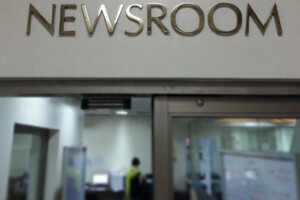The Wall Street Journal reports that politicians are moving away from blanket TV advertising now that they have sophisticated ways to figure out which kinds of voters or potential voters are watching which kinds of programs and when. WSJ subscribers can read the full story here.
Political: It’s TV + Online, Not TV vs. Online
Why broadcast TV will continue to dominate political advertising for the next few election cycles
Why Politicians Continue To Avoid Digital Ads
Just 3.3% of political ad spending will go to online this year. The problem: Too many old fogies running the campaigns. Kip Cassino, executive vice president at Borrell Associates, talks about why politicians lag behind on the digital front, how that could change in by 2016 and what the role of cable is in political ad spending.
A law restricting advertising on public television will remain in place after the Supreme Court refused to review a case in which KMTP San Francisco challenged its FCC fine for airing messages from a bevy of commercial sponsors.
KMGH Pulls Political Ad Order From Website
A TV ad-buying company with close ties to Republican Party leaders reserved a whopping 1,326 spots in the Denver market this fall, but the station receiving the $740,070 contract, ABC affil KMGH, removed it from public view when a reporter tried to learn who was footing the bill.
The Koch brothers’ main political arm intends to spend more than $125 million this year on an aggressive ground, air and data operation benefiting conservatives, according to a memo distributed to major donors and sources familiar with the group. The projected budget for Americans for Prosperity would be unprecedented for a private political group in a midterm, and would likely rival even the spending of the Republican and Democratic parties’ congressional campaign arms.
 Candidates and their consultants need to up their advertising game in order to be effective in a media market saturated with spending by outside groups. The recent Supreme Court ruling in the McCutcheon case was expected to tip the balance of spending power back in favor of candidates and national parties. But a new report from the Wesleyan Media Project shows that ad spending by outside groups is dwarfing candidate output.
Candidates and their consultants need to up their advertising game in order to be effective in a media market saturated with spending by outside groups. The recent Supreme Court ruling in the McCutcheon case was expected to tip the balance of spending power back in favor of candidates and national parties. But a new report from the Wesleyan Media Project shows that ad spending by outside groups is dwarfing candidate output.
The Campaign Legal Center and the Sunlight Foundation tell the FCC that 11 stations have violated disclosure rules, including failure to identify candidates referred to in the ads, the issue of national importance to which the ad refers and the CEO or board of the advertiser.
The 2014 election cycle has ushered in a rush of political advertising, with campaign ads airing as early as last spring and record-shattering spending for the first quarter of the election year.
Newton Minow and Henry Geller are asking the FCC to change its rule that requires only disclosure of the actual sponsor of issue ads to also require identification of the individuals or groups who donated funds to the sponsor such ads.
Detroit: An Unexpected Spike For Political
 Detroit will see more political advertising than expected this year after an unexpected decision opened up a seat that hasn’t been in play for more than a decade. On Friday Michigan U.S. Rep. Mike Rogers said he’s decided to pursue a career in talk radio rather than seek reelection in the state’s 8th Congressional District. Rogers, a Republican, has held the seat for 14 years and was expected to coast to another easy win. The race will add money to a local TV market that was already expecting strong activity from the state’s U.S. Senate and gubernatorial races.
Detroit will see more political advertising than expected this year after an unexpected decision opened up a seat that hasn’t been in play for more than a decade. On Friday Michigan U.S. Rep. Mike Rogers said he’s decided to pursue a career in talk radio rather than seek reelection in the state’s 8th Congressional District. Rogers, a Republican, has held the seat for 14 years and was expected to coast to another easy win. The race will add money to a local TV market that was already expecting strong activity from the state’s U.S. Senate and gubernatorial races.
 Social media is expected to make up half of the $71.16 million in digital advertising spending for 2014, according to Michael Bassik of Proof Integrated Communications. Still Bassik suggests that local would fare better against Facebook and Twitter when competing for political ad dollars by bundling traditional media buys with a digital component.
Social media is expected to make up half of the $71.16 million in digital advertising spending for 2014, according to Michael Bassik of Proof Integrated Communications. Still Bassik suggests that local would fare better against Facebook and Twitter when competing for political ad dollars by bundling traditional media buys with a digital component.
 Coming out of the 2012 presidential election, big data was the talk of the town. It has caused a wave of change, resulting in organizations building technology, acquiring data and learning the statistical software R—a free software for statistical computing and graphics. Caught up in this wave is how the biggest line item in any campaign budget is being scrutinized: television.
Coming out of the 2012 presidential election, big data was the talk of the town. It has caused a wave of change, resulting in organizations building technology, acquiring data and learning the statistical software R—a free software for statistical computing and graphics. Caught up in this wave is how the biggest line item in any campaign budget is being scrutinized: television.
Dish Network and DirecTV are combining their sales efforts for addressable TV advertising for political campaigns.
Political Ad Spending Seen Dipping In 2014
 Don’t look for more political TV dollars this year. But two years from now, the situation will change. Financial credit rating agency Moody’s predicts a 10% decline in political advertising spending to $2.6 billion for 2014 — down from the $2.9 billion. Moody’s says it’s only the second time since 1980 that political advertising will decline in a non-recession election year.
Don’t look for more political TV dollars this year. But two years from now, the situation will change. Financial credit rating agency Moody’s predicts a 10% decline in political advertising spending to $2.6 billion for 2014 — down from the $2.9 billion. Moody’s says it’s only the second time since 1980 that political advertising will decline in a non-recession election year.
 Today is election day, and while political spending is low this year, with only two gubernatorial races and no congressional or presidential contests, advertising will ramp up over the next few months for what’s expected to be another record spending year in 2014. The latest report from Kantar Media’s Campaign Media Analysis Group and Cook Political Report predicts that $6 billion will be spent on next year’s elections, a midterm record. That’s up about $100 million over 2010, the last congressional but non-presidential election year. The spending will include $3 billion on TV, 80% of which will go to local.
Today is election day, and while political spending is low this year, with only two gubernatorial races and no congressional or presidential contests, advertising will ramp up over the next few months for what’s expected to be another record spending year in 2014. The latest report from Kantar Media’s Campaign Media Analysis Group and Cook Political Report predicts that $6 billion will be spent on next year’s elections, a midterm record. That’s up about $100 million over 2010, the last congressional but non-presidential election year. The spending will include $3 billion on TV, 80% of which will go to local.
Ad Dollars Pouring In For Va. Gubernatorial
The race pits Democrat Terry McAuliffe against Republican Ken Cuccinelli. And while McAuliffe leads the latest polls, Republicans are doing all they can to hold onto the governor’s office. That’s driving the market’s tight conditions on television, which is expected to continue until November.
Stations Need To Work Harder For Political
 “TV stations across the country have gotten kind of lazy,” says Jim Innocenzi of the political ad firm Sandler-Innocenzi. “I think the local TV stations have to go out there and bump their hump a little more” to increase their slice of the political advertising pie.
“TV stations across the country have gotten kind of lazy,” says Jim Innocenzi of the political ad firm Sandler-Innocenzi. “I think the local TV stations have to go out there and bump their hump a little more” to increase their slice of the political advertising pie.
There’s been considerable hoopla about how the Obama campaign exploited Rentrak data as part of the most effective voter targeting effort ever, but word emerged Tuesday that Republicans were clients, too. The GOP firm National Media Research, Planning and Placement (NMRPP) employed it for strategy while representing clients and has re-upped with Rentrak, saying it will use the company’s set-top-box data for local buys on broadcast stations and cable networks in the 2013-14 campaign cycle for congressional and statewide races.
 Having indentified 15 million unsure individuals whom they felt they could persuade to vote for Obama, the president’s winning campaign used Rentrak set-top box data to determine what shows they were watching and then targeted them with TV spots.Good news for broadcasters is that two of the top shows to buy were syndication’s The Insider and Judge Joe Brown. Bad news is that many of the shows were on cable. Obama ran nearly twice as many cable ads as Romney on more than twice as many channels, 100, and spent 35% less per spot. The brains behind the “optimizer” media strategy are now hoping to cash in in the commercial realm.
Having indentified 15 million unsure individuals whom they felt they could persuade to vote for Obama, the president’s winning campaign used Rentrak set-top box data to determine what shows they were watching and then targeted them with TV spots.Good news for broadcasters is that two of the top shows to buy were syndication’s The Insider and Judge Joe Brown. Bad news is that many of the shows were on cable. Obama ran nearly twice as many cable ads as Romney on more than twice as many channels, 100, and spent 35% less per spot. The brains behind the “optimizer” media strategy are now hoping to cash in in the commercial realm.
Cruz Warns Wheeler On Political Ads
Disclosure of funding of political advertising has become a hot topic in Congress. And Republican Senator Ted Cruz made sure that FCC Chairman nominee Tom Wheeler knew that his fellow GOP members want the FCC to keep its hands off any attempts at imposing disclosure requirements on such ads.”This is the one issue that has in my opinion the potential to derail your nomination,” he said.
Several months ago, a panel of the Ninth Circuit Court of Appeals created shockwaves throughout the noncommercial broadcasting community by holding that the Communications Act’s prohibitions against the sale of advertising time by noncommercial stations was unconstitutional when applied to political advertising. That decision may be short-lived, as the full Court of Appeals, in reviewing the decision of the initial three judge panel, has indicated that the case should not be relied on as precedent in any other court decision until the full court can complete its review.
Don’t Take Presidential Dollars For Granted

While most presidential candidates on Tuesday were concentrating on last-minute campaign events aimed at swaying undecided voters, independent presidential candidate Randall Terry was instead focused on winning votes at the FCC, filing multiple election day political advertising complaints against broadcast stations.
Among the biggest winners in Tuesday’s election were broadcasters in swing states like Colorado. “In 2012, we are estimating the political dollars spent in Denver to be around $67-$68 million and in the state to be around $86 million,” according to one market source.
President Barack Obama’s campaign is still beating Mitt Romney’s in TV ads, in both volume and in spending, by more than 2 to 1. From April through Oct. 29, the Obama campaign spent $266 million, while the Romney campaign spent $105.4 million, according to an analysis of Kantar Media/CMAG data by the Wesleyan Media Project.
Political Ad Market: From Feast To Famine
 In DMA 56, Little Rock, Ark., spending on election campaigns is sparse. The presidential candidates are ignoring the state because Mitt Romney has a lock on its six electoral votes, and there are no major state offices up for grabs. But it’s a much different story in DMA 69 — Roanoke-Lynchburg, Va. — where stations are having trouble coping with the enormous demand for time.
In DMA 56, Little Rock, Ark., spending on election campaigns is sparse. The presidential candidates are ignoring the state because Mitt Romney has a lock on its six electoral votes, and there are no major state offices up for grabs. But it’s a much different story in DMA 69 — Roanoke-Lynchburg, Va. — where stations are having trouble coping with the enormous demand for time.
On a state-of-the-race call with reporters, President Obama’s campaign manager said they’re about to air ads in Pennsylvania to counter the pro-Mitt Romney super PAC Restore Our Future’s buy that Jonathan Martin reported on earlier.
More than 915,000 presidential ads have aired on broadcast and national cable through Oct. 21, a 44.5% jump from the 637,000 ads that aired in 2008, according to the Wesleyan Media Project. But unlike 2008, the ads have been concentrated in nine states, far fewer than in 2008.
The pro-Mitt Romney super PAC Restore Our Future launched an $18 million advertising blitz today, with buys in Colorado, Florida, Iowa, Michigan, Nevada, New Hampshire, North Carolina, Ohio, Virginia and Wisconsin.
Faced with an unprecedented flood of commercials for candidates and causes, Washington’s TV stations have had to get creative to fit them all in. Some are trimming their regular programming to squeeze in a few more ads, and some are adding more news at other hours.
Why Don’t Stations Pull More SuperPAC Ads?
Even though broadcasters can reject political ads that come from third-party groups, they rarely do, and we seemingly see just as many outrageous claims about candidates in third-party ads as we see in the candidate ads that can’t be censored. Why don’t broadcasters more aggressively decide which ads are truthful and which are not, and reject those ads that are not accurate?
By the end, the campaigns and independent groups will have spent about $1.1 billion on TV advertising this year, with $750 million already allocated in the handful of states likely to determine the outcome of the contest. There’s no doubt that TV advertising has the power to shift voter perceptions, particularly when a candidate is not well known. But It’s also enough to turn off voters, leaving them frustrated and annoyed.
Stations Doing Their Bit For Electoral Politics

Campaign Media Accountability LLC will examine media outlets to audit political ad buys and seek quick refunds where the client campaign didn’t get what it paid for after being bumped for higher-paying spots. Co-founder Thom Carroll says “there are significant dollars that did not happen as they were supposed to and there are refunds due to campaigns.”
Record Political Spend Rescues Soft Market
Magna Global says total local television political advertising was $273.9 million in 2Q 2012 with a growth rate of 29.8%, compared with 2010.
Unlike other presidential campaigns, which typically outsource their ad reservations and placement to specialized firms with large teams that know how to make the most of the complicated FCC payment procedures, Romney does all his TV buying in-house through a lean operation headed by a single chief buyer.
Super PACs Pay Up To 4X More For TV Spots
 A TVNewsCheck review of the online political files of several stations in three swing states reveals that super PACs and other groups not directly affiliated with candidates sometimes pay three or four times more for spots than do candidates who are entitled to the the lower unit rate discount by federal law.
A TVNewsCheck review of the online political files of several stations in three swing states reveals that super PACs and other groups not directly affiliated with candidates sometimes pay three or four times more for spots than do candidates who are entitled to the the lower unit rate discount by federal law.
Like a lot of other swing state markets, Roanoke, Va., is enjoying a windfall in poltical advertising this election season, even as viewers complain about the incessant spots. Jeffrey Marks, GM of CBS affiliate WDBJ, says the market is now expecting to get more than double the $5 million originally forecast from the presidential contest alone.









































